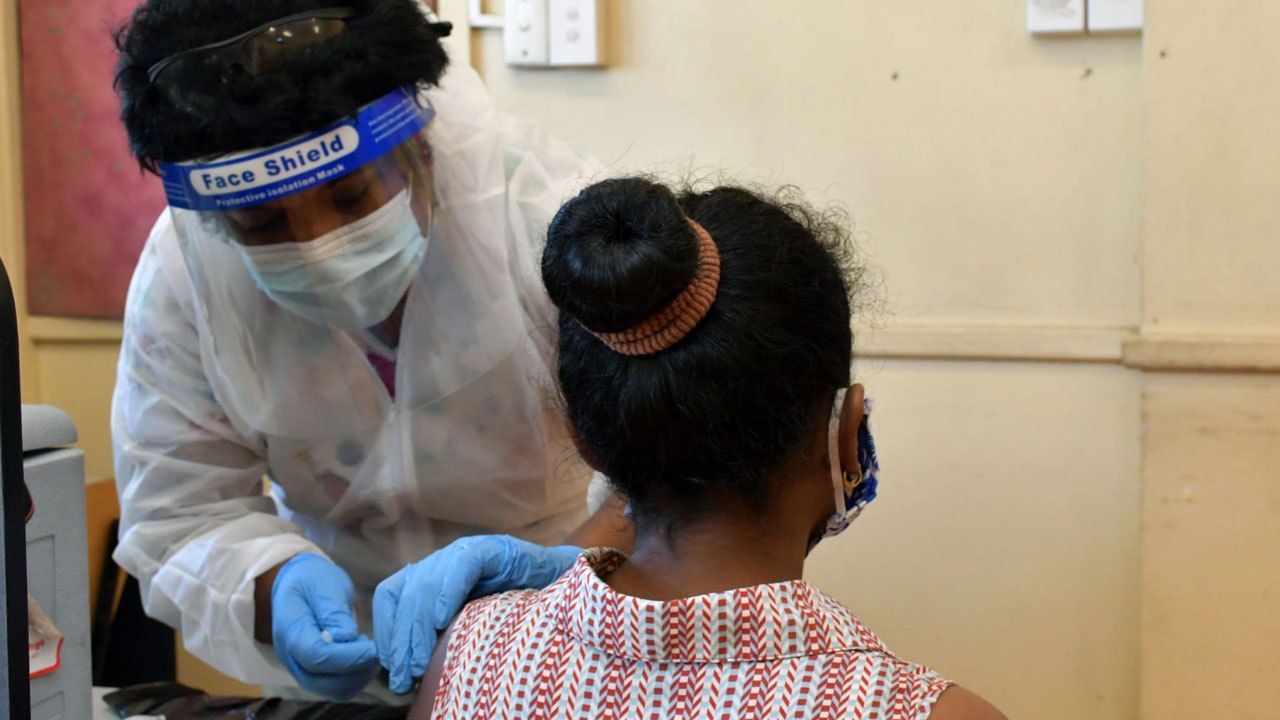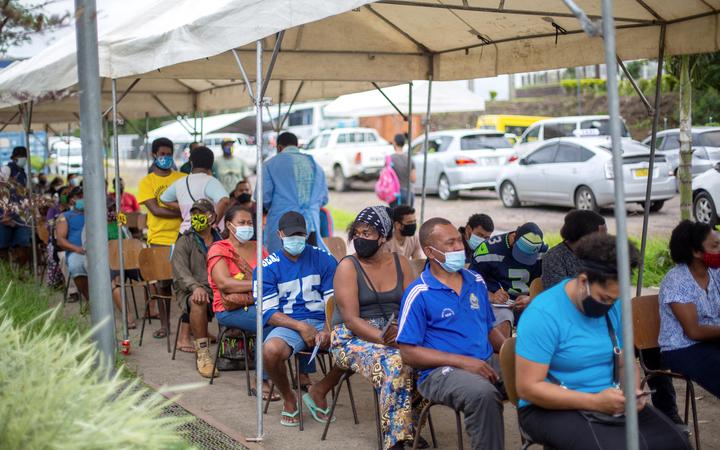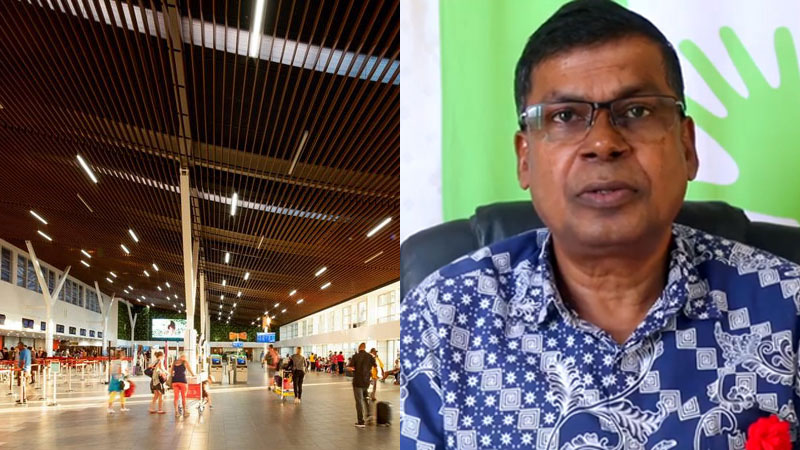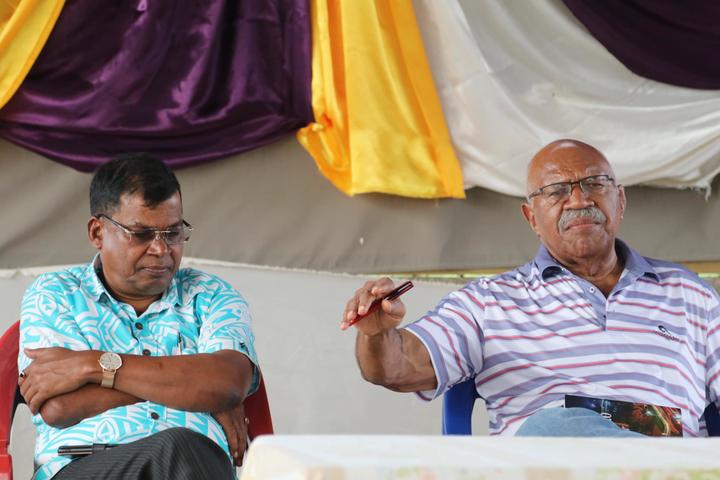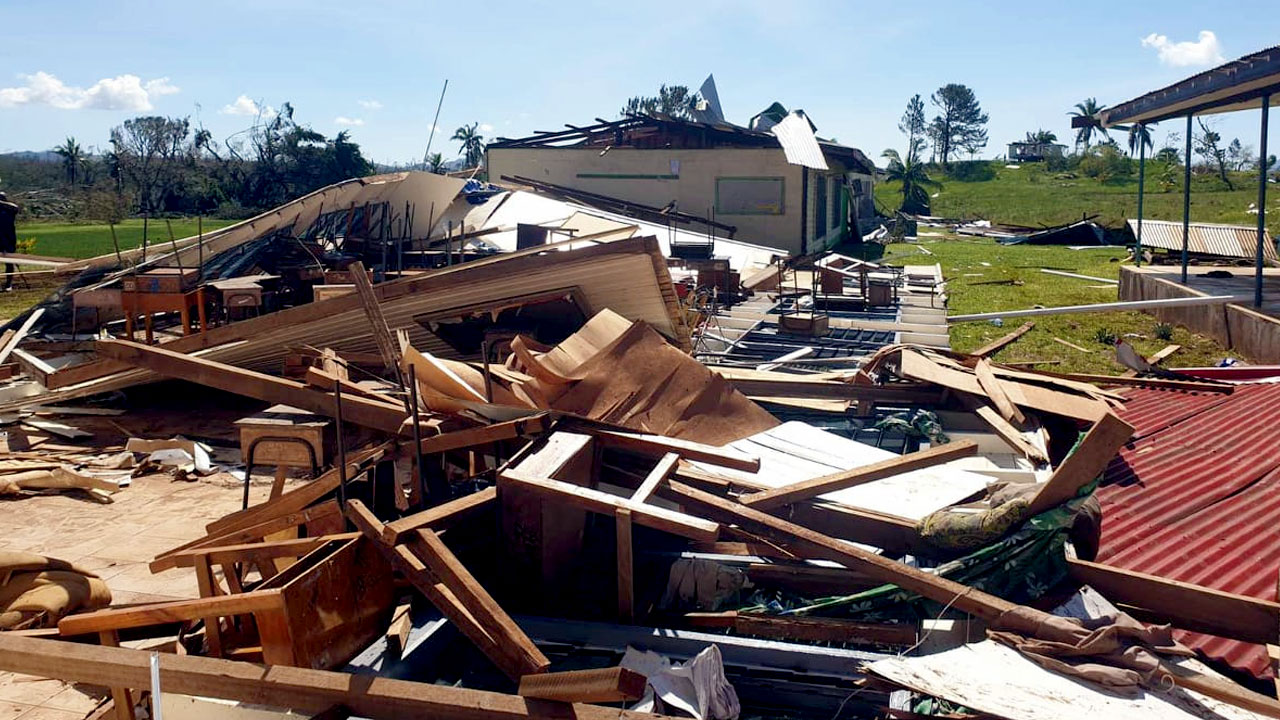The Fiji Times » Ready for anything Fiji Times
http://dlvr.it/S5W5JJ
Thursday, August 12, 2021
Wednesday, August 11, 2021
Aquarius On The Beach excited about Tourism Fiji's announcement that they are planning for reopening of our borders to tourists on 1st December this year - Fijivillage
Aquarius On The Beach excited about Tourism Fiji's announcement that they are planning for reopening of our borders to tourists on 1st December this year Fijivillage
http://dlvr.it/S5RcVl
http://dlvr.it/S5RcVl
Australia supplies another 500,000 COVID-19 vaccine doses to Timor-Leste and Fiji - SBS News
Australia supplies another 500,000 COVID-19 vaccine doses to Timor-Leste and Fiji SBS News
http://dlvr.it/S5RcSh
http://dlvr.it/S5RcSh
Tuesday, August 10, 2021
Monday, August 09, 2021
Telecom Fiji improves digital experiences for customers with Oracle - iTWire
Telecom Fiji improves digital experiences for customers with Oracle iTWire
http://dlvr.it/S5JgQZ
http://dlvr.it/S5JgQZ
Sunday, August 08, 2021
Saturday, August 07, 2021
The Miscontrol of the COVID-19 Narrative in Fiji and Elsewhere.
Fiji's Minister of Health came out swinging earlier this week and in a FBC article castigated the media industry for allowing some Doctors to publicly comment on the much hyped vaccination drive in Fiji. The Minister essentially called for a tyrannical styled censorship of any person not following the 'party line' on vaccination and its effects: short, medium and long term on human health.
One such person that fits the description alluded to by Minister Waqanibete, would be his former work mate, Dr. Jone Hawea, a skilled surgeon who also has a significant media presence and attracted much more recently when he publicly spoke out against the Fiji Government nascent regulations of "No Jab, No Job".
These sentiments of speaking truth to power, demonstrated by Dr. Havea have won many admirers among the silent majority in Fiji, cognizant of cold hard facts steeped in Science, which has long been obfuscated in the political discourse in Fiji, particularly surrounding the due diligence of consultation and informed consent; priort to vaccination.
The global COVID 19 vaccination drive appears to be a carefully, coordinated and crafted campaign that has been designed by World Health Organization (WHO) and it's compatriot organisation, Global Alliance for Vaccination and Immunization (GAVI) which also based in Geneva, Switzerland.
The information war on COVID-19 is examined, through the lens of Propaganda, outlined in Asia Pacific Today posted below.
Minister Waqanibete was forced to condemn comments made by two doctors (without specifically naming them) that have considerable following on social media and have spoken out against the COVID19 vaccination.
Dr. Hawea continues to appear in The Fiji Times, highlighting significant shortcomings and misrepresentations, as a recent article about the transmission of COVID19, Dr. Havea outlined that according to a study, it shows that vaccinated people are capable of spreading the virus, as much as unvacinated persons, citing a CDC study in Massachusetts.
Dr. Havea's remarks, rang alarm bells, much to the trepidation to those Health bureaucrats located at Dinem House, Amy street, Toorak, as the CDC study contradicted and undermined the very objectives of "No Jab, No Job" regulations im Fiji.
It's no secret that many Medical Professionals in Fiji are scared of speaking out.
Dr. Hawea's truth telling persona is similar to American Frontline Doctors and New Zealand Doctors Speaking Out With Science.
There is much to be thankful from these Doctors who have courageously stood by their moral ethics and their Hippocratic oath. It's also a lesson in integrity that the Medical Bureaucracy at W.H.O and Fiji have sold for 30 pieces of Silver.
Undoubtedly, there is a groundswell support of people who are united in their opposition to Government overreach into mandating COVID-19 vaccination and other authoritarian and despotic control of people's lives.
There is a Zeitgeist of public frustration and a gnawing rage in the fabric of society, angry at their Governments who appear to be doing the bidding of a hidden group of people. France has been protesting the proposed vaccination passport and there are more countries joining.
The Fiji Times » Food security and state responsibility - Fiji Times - Fiji Times
The Fiji Times » Food security and state responsibility - Fiji Times Fiji Times
http://dlvr.it/S5CRhm
http://dlvr.it/S5CRhm
The Fiji Times » Assistance gives financial boost to business - Fiji Times
The Fiji Times » Assistance gives financial boost to business Fiji Times
http://dlvr.it/S5CRdZ
http://dlvr.it/S5CRdZ
Friday, August 06, 2021
Thursday, August 05, 2021
Wednesday, August 04, 2021
Fiji Airports Limited's $106 million finance facility through ANZ is not a Fijian Govt borrowing and also not a Govt guaranteed loan - Fijivillage
Fiji Airports Limited's $106 million finance facility through ANZ is not a Fijian Govt borrowing and also not a Govt guaranteed loan Fijivillage
http://dlvr.it/S51My3
http://dlvr.it/S51My3
Kumar: 1599 vendors not vaccinated and disallowed entry into markets - Fiji Times
Kumar: 1599 vendors not vaccinated and disallowed entry into markets Fiji Times
http://dlvr.it/S51Mx4
http://dlvr.it/S51Mx4
Tuesday, August 03, 2021
Fiji: Stop Attempts to Silence the Political Opposition.
The police harassment of opposition politicians for their criticism of the land law amendments highlights the restrictive space for civic freedoms in Fiji, said global civil society alliance CIVICUS today.
The authorities must halt such actions immediately and respect the right to freedom of expression.
According to reports, nine prominent opposition politicians were arrested and questioned in Fiji for voicing concerns about a contentious land bill.
Six members of parliament and three other high-profile politicians were taken into custody by the criminal investigations department on 25 and 26 July in relation to comments they had made regarding proposed amendments to a land bill.
They were subsequently released.
The nine are Viliame Gavoka, the leader of the opposition Social Democratic Liberal party (Sodelpa) party; the opposition whip Lynda Tabuya; the MPs Adi Litia Qionibaravi and Ro Filipe Tuisawau; Biman Prasad, the leader of the National Federation party; the NFP president, Pio Tikoduadua; the former prime ministers Sitiveni Rabuka and Mahendra Chaudhry; and the Unity Fiji leader, Savenaca Narube.
“This intimidation of opposition lawmakers and politicians just for their criticism of the land bill amendments must end.
It is a blatant attack on their rights to peaceful expression and association.
Everyone, including the political opposition, have a legitimate right to take part in public affairs and should not be silenced just because the authorities don’t like it,” said Josef Benedict, CIVICUS’s Asia Pacific researcher.
We are also concerned about reports that a volunteer for National Federation Party was arrested ; on 28 July after a raid on his home, linked to his opposition to the law, and detained at Totogo Police Station. He must be released immediately.
Civic space in Fiji is currently rated as ‘Obstructed’ by the CIVICUS Monitor.
The harassment of the pollical opposition takes place in the context of restrictions on freedom of expression and other human rights violations in Fiji. Sedition provisions in the Crimes Act and the Public Order (Amendment) Act have been used to target journalists, activists and government critics.
Further, the right to peaceful assembly has been arbitrarily restricted with the use of the Public Order (Amendment) Act 2014.
Background
There has been widespread protest from politicians, public figures and many in the community over the government’s intention to amend the iTaukei Land Trust Act.
At the moment, any individual leasing land or wishing to make changes to a lease must do so through the iTaukei Land Trust Board, which was established to protect indigenous landowners’ rights – but the amendment removes this protection.
The NGO Coalition on Human Rights (NGOCHR) has demanded greater consultation and collaboration with all relevant stakeholders regarding any proposed changes to the law.
Monday, August 02, 2021
Sunday, August 01, 2021
Heavy police presence: Officers deployed to carry out awareness campaigns – Tudravu - Fiji Times
Heavy police presence: Officers deployed to carry out awareness campaigns – Tudravu Fiji Times
http://dlvr.it/S4qXLj
http://dlvr.it/S4qXLj
Saturday, July 31, 2021
Friday, July 30, 2021
Report Finds COVID-19 Impacts Unrelenting On Fijian Private Sector - Fiji Sun Online
Report Finds COVID-19 Impacts Unrelenting On Fijian Private Sector Fiji Sun Online
http://dlvr.it/S4jtB7
http://dlvr.it/S4jtB7
Thursday, July 29, 2021
X-Post: Fiji’s Othe Crisis: Away from the COVID emergency, Political Dissent Can Still Get you Arrested.
Dominic O'Sullivan, Charles Sturt University.
July 29, 2021 12.30pm AEST.
The arrest of nine Fijian opposition politicians, including party leaders and two former prime ministers, once again exposes Fijian democracy’s fragility.
The intimidation doesn’t bode well for the parliamentary elections due next year (or early 2023).
The political crisis has been overshadowed by Fiji’s COVID-19 crisis, which has seen more than 25,000 infections and over 100 deaths since April.
Prime Minister Frank Bainimarama even used a COVID analogy when he called those arrested “super-spreaders of lies”.
While no charges have been laid, the nine are accused of inciting unrest by opposing a government bill to change the management of iTaukei (indigenous) land rights.
The original iTaukei Land Trust Act 1940 allows for long-term land leases to private interests. The idea is to maximise the economic return on land, while protecting it against permanent alienation.
The act aims to protect indigenous interests by prohibiting the sub-lease or raising of mortgages on leased land without the consent of the iTaukei Land Trust Board.
The proposed amendment would remove the requirement to obtain the board’s consent, and prevent land owners going to court to dispute land use.
Arresting the opposition
Bainimarama, who also chairs the board, says the bill’s purpose is to remove bureaucratic obstacles to minor activities such as arranging electricity or water supply. He says the board takes too long to provide consent and this is a constraint on economic development.
But critics of the bill, including some of those arrested, argue it will weaken iTaukei land rights. Opposition MP Lynda Tabuya was accused of a “malicious act” after she posted a “Say no to iTaukei Land Trust Bill” cover picture on Facebook last week.
In a separate post, demonstrating the low threshold for “malice” in modern Fiji, she asked:
What protection is left for landowners? This is absolutely illegal and a breach of human rights of landowners. This is not a race issue, this is a human rights issue and breaches Section 29 of the Fijian Constitution.
Tabuya is not alone. The National Federation Party has said the government has not properly consulted on the bill, and party leader Biman Prasad was among those arrested, along with former prime ministers Mahendra Chaudhry and Sitivini Rabuka.
Limited media scrutiny
Media coverage, too, has felt the effects of the arrests. For example, the Fiji Sun’s one story on the issue in its July 28 edition cited only supporters of the bill and offered no insight into why it was controversial.
This isn’t surprising, given Fijian journalism operates under a constitutional provision limiting its rights and freedoms “in the interests of national security, public safety, public order, public morality, public health or the orderly conduct of elections”.
The Fiji Times took a risk last week by publishing an opinion column arguing poor drafting and failure to consult meant the bill goes further than its purported aims of administrative simplicity and efficiency.
Beyond the legal complexities of the land bill, however, the real problem is political.
As the article asks, “What’s the issue?”.
As I discuss in my book Indigeneity: a politics of potential — Australia, Fiji and New Zealand, the issue is that Fiji is a fragile, reluctant and conditional democracy.
Military Interference
Coups in 1987 and 2006, and a putsch in 2000, happened because democracy failed to provide the perpetrators with the “right” answers to complex political questions at the intersection of class, military power and personal interest.
The rights of indigenous Fijians were always a side issue, as the present conflict shows.
The 2013 constitution established that “it shall be the overall responsibility of the Republic of Fiji Military Forces to ensure at all times the security, defence and well-being of Fiji and all Fijians”.
Military oversight of the workings of government is intentional and explicit. When Bainimarama (then head of the military forces) led the 2006 coup, he was dismissive of accusations of political interference.
If the military didn’t act against the government, he said, “this country is going to go to the dogs”.
He also claimed then-prime minister Laisenia Qarase was trying to weaken the army by attempting to remove him: “If he succeeds there will be no one to monitor them, and imagine how corrupt it is going to be.”
No room to move
Intimidation is political strategy in Fiji. The proposed amendments to the iTaukei Land Trust Act are not what is at stake — a functioning parliamentary process could identify and resolve any substantive disagreements.
The bigger issue is that autocratic leadership, and the national constitution itself, leave little room for Fijian citizens to work out for themselves the kind of society they want.
This also leaves little room for Fijians to demand more effective policy responses to their country’s COVID-19 crisis.
Dominic O'Sullivan
Adjunct Professor, Faculty of Health and Environmental Sciences, Auckland University of Technology and Professor of Political Science, Charles Sturt University.
Dominic O'Sullivan does not work for, consult, own shares in or receive funding from any company or organisation that would benefit from this article, and has disclosed no relevant affiliations beyond their academic appointment.
Charles Sturt University provides funding as a member of The Conversation AU.
Wednesday, July 28, 2021
Fiji beats New Zealand to clinch back-to-back Olympic titles - The Washington Post
* Fiji beats New Zealand to clinch back-to-back Olympic titles The Washington Post
* Rugby-Fiji retain title with emphatic win over New Zealand Reuters
* Fiji defeats New Zealand, clinches back-to-back gold medals in rugby 7s WPTV.com
* Fiji, Britain into semifinals, Argentina upsets South Africa Associated Press
* Defending champion Fiji to meet New Zealand in 7s final Sacramento Bee
* View Full Coverage on Google News
http://dlvr.it/S4ZdKF
http://dlvr.it/S4ZdKF
Tuesday, July 27, 2021
By RICHARD NAIDU
ATTORNEY-GENERAL Aiyaz Sayed-Khaiyum has issued a very long, 30-paragraph defence of the iTaukei Land Trust (Amendment) Bill.
But I am not sure he has really got to the point.
The aim of the law change, he says, is to speed up the backlog of mortgage consent applications at the iTaukei Land Trust Board. Once this is done (he seems to suggest) investment will flow, and the value of iTaukei land leases will increase; and this will be great for landowners.
This is fantasy. Whoever has drafted the amendment Bill does not seem ever to have worked in the real world of dealing with iTaukei leases. For the past 25 years, I have worked for commercial tenants of iTaukei land. So let me try to enlighten him.
To cover every argument would take a lot more words. But let’s try to hit the key points. I am not talking here about the need to consult. Should the Government consult landowners? Of course it should. It is very important. That is just obvious.
What is the problem? The Government thinks this is a commercial problem. So let’s talk about commercial and tourism leases from TLTB.
TLTB usually approves mortgage consents in less than a week. No commercial lawyer I have talked to says differently.
If a request is more urgent, in my experience, TLTB will try to help.
TLTB’s fees for commercial lease consents are expensive – up to $1,000 plus VAT. So we should expect good service.
Most applications run smoothly. Occasionally they do not.
If TLTB thinks there is a problem with the mortgage or the lease, there may be delays. But that is normal, as in any process.
So — that’s TLTB leases. Now, what about leasing from the Government — State leases? State leases are a problem. To get a mortgage consent for a State lease can take weeks, or even months. The Government also wants a legal fix for the State Lands Act and Government leases. That is in Bill No 16.
One of the Government’s mistakes is to treat these two different types of land with exactly the same fix. The laws are One of the Government’s mistakes is to treat these two different types of land with exactly the same fix.
The laws are different. different.
“Cut, paste, vote”
In one sense each of the State Lands Act and the TLTB Act are the same.
They each say “you must not deal with my leased land without my consent”.
But they each say it in a different way.
The TLTB Act says a lessee can’t “alienate or deal with” a TLTB lease without consent. It also says that it is “in the absolute discretion” of TLTB whether it consents or not. That is all the TLTB Act says about it.
Is a mortgage a “dealing”? We all accept that it is – so end of story. We ask for consent. The State Lands Act says it differently. A lessee must get permission before it “alienates or deals with” State land (same as TLTB Act).
But a State land lessee must also get permission before it “mortgages, charges or pledges” the lease, or goes to court about the lease. And anyone who wants to lodge a caveat against a State lease must also get Government permission.
The TLTB Act does not have these additional restrictions. The law is different.
Has the Attorney-General’s Office realised this? Because it has simply put the same words into both of the Bills.
A good law firm frowns on “cut, paste print” lawyering. These Bills seem to be “cut, paste, vote” legislating. That is not a good way to change the law. If Bill No 17 had been circulated for consultation, we could point out these things.
So both laws are to be changed saying that consent is not needed for mortgages, charges, pledges, caveats and so on – but in a very long-winded way.
But there’s more If that was the only issue, we might just say “more badly-written laws, – Richard Naidu – what’s new?”
But that’s not all there is. In both Bills – 16 and 17 – there is another new subclause.
More cutting and pasting. And this is the change that bothers me, and which nobody seems to be focused on.
Each Act will also be changed to say this: “For the purposes of this section, any such consent shall only be refused where there is a breach of any lease condition or where such application to deal with the land is not in accordance with any law”.
What does this mean? For TLTB, it changes the rules. It means any lessee of TLTB land can sublease to anyone else — or sell a TLTB lease to anyone else — and TLTB must agree.
There are only two exceptions to this new rule; • if the lessee has breached the lease (for example, the lessee has not paid its rent); or • if the sale or sub-lease would breach a law (for example, a foreign investor is not allowed to do business on the land).
The explanatory notes to the Bill do not talk about this change. Nor do they say why this change is needed.
The TLTB Act says TLTB is supposed to have “absolute discretion” on any “alienation or dealing” with a TLTB lease. So why is this discretion being altered? Imagine you own a house and you rent it to someone. Your tenant says to you: “By the way, as long as I pay my rent, I can put another tenant in the house. Or maybe I will let someone else stay there and charge them a higher rent. And you can’t stop me. Would you agree to that? If you would not, why should TLTB be made to do that? Why is the government doing this? Most people know I am not a big fan of our current government. Do I think they are trying to take away landowners’ control of their land? No. I don’t think they mean to. But they don’t seem to know what they’re doing. And they never ask anyone for advice first. So they don’t seem to understand “the reality of the matter”.
These law changes do things that maybe they haven’t thought about. They need to be properly discussed. This Government is constantly rushing into Parliament to change any law it wants to, any time it wants to, without thinking clearly about it.
Many of our laws — including the TLTB Act — are decades old. They were well-designed, by expert legal drafters.
These people consulted properly and put thought and care into their words.
Now I see a lot of bad legal drafting being just “glued on” to good laws to satisfy some poorly thought out political whim.
It’s a bit like putting a Kia bumper onto the front of a Rolls-Royce.
If you have a problem in Government, look for the right ways to fix it. If there are delays at the Department of Lands, find out why and fix them. Don’t just reach for your pen to change the law.
Laws should be treated with more respect than that.
More value? And finally — what will be the effect of this law on iTaukei land? Will it make it more marketable? Will it make it more valuable? It will not change its value one bit. In 25 years of practice, I have never heard a developer, a banker, a lessee — or even a landowner say “gosh, if only there was no mortgage consent — iTaukei land would be so much more valuable”.
Political sloganeering is very different from the serious business of law. The two should not be mixed up. It’s great to say in the Budget speech “we will fix all the problems”. But there has to be a real problem first. This is just “a solution looking for a problem”. In the process it is creating a much bigger one.
• RICHARD NAIDU is a Suva-based lawyer. The views expressed in this article are not necessarily the views of The Fiji Times
But I am not sure he has really got to the point.
The aim of the law change, he says, is to speed up the backlog of mortgage consent applications at the iTaukei Land Trust Board. Once this is done (he seems to suggest) investment will flow, and the value of iTaukei land leases will increase; and this will be great for landowners.
This is fantasy. Whoever has drafted the amendment Bill does not seem ever to have worked in the real world of dealing with iTaukei leases. For the past 25 years, I have worked for commercial tenants of iTaukei land. So let me try to enlighten him.
To cover every argument would take a lot more words. But let’s try to hit the key points. I am not talking here about the need to consult. Should the Government consult landowners? Of course it should. It is very important. That is just obvious.
What is the problem? The Government thinks this is a commercial problem. So let’s talk about commercial and tourism leases from TLTB.
TLTB usually approves mortgage consents in less than a week. No commercial lawyer I have talked to says differently.
If a request is more urgent, in my experience, TLTB will try to help.
TLTB’s fees for commercial lease consents are expensive – up to $1,000 plus VAT. So we should expect good service.
Most applications run smoothly. Occasionally they do not.
If TLTB thinks there is a problem with the mortgage or the lease, there may be delays. But that is normal, as in any process.
So — that’s TLTB leases. Now, what about leasing from the Government — State leases? State leases are a problem. To get a mortgage consent for a State lease can take weeks, or even months. The Government also wants a legal fix for the State Lands Act and Government leases. That is in Bill No 16.
One of the Government’s mistakes is to treat these two different types of land with exactly the same fix. The laws are One of the Government’s mistakes is to treat these two different types of land with exactly the same fix.
The laws are different. different.
“Cut, paste, vote”
In one sense each of the State Lands Act and the TLTB Act are the same.
They each say “you must not deal with my leased land without my consent”.
But they each say it in a different way.
The TLTB Act says a lessee can’t “alienate or deal with” a TLTB lease without consent. It also says that it is “in the absolute discretion” of TLTB whether it consents or not. That is all the TLTB Act says about it.
Is a mortgage a “dealing”? We all accept that it is – so end of story. We ask for consent. The State Lands Act says it differently. A lessee must get permission before it “alienates or deals with” State land (same as TLTB Act).
But a State land lessee must also get permission before it “mortgages, charges or pledges” the lease, or goes to court about the lease. And anyone who wants to lodge a caveat against a State lease must also get Government permission.
The TLTB Act does not have these additional restrictions. The law is different.
Has the Attorney-General’s Office realised this? Because it has simply put the same words into both of the Bills.
A good law firm frowns on “cut, paste print” lawyering. These Bills seem to be “cut, paste, vote” legislating. That is not a good way to change the law. If Bill No 17 had been circulated for consultation, we could point out these things.
So both laws are to be changed saying that consent is not needed for mortgages, charges, pledges, caveats and so on – but in a very long-winded way.
But there’s more If that was the only issue, we might just say “more badly-written laws, – Richard Naidu – what’s new?”
But that’s not all there is. In both Bills – 16 and 17 – there is another new subclause.
More cutting and pasting. And this is the change that bothers me, and which nobody seems to be focused on.
Each Act will also be changed to say this: “For the purposes of this section, any such consent shall only be refused where there is a breach of any lease condition or where such application to deal with the land is not in accordance with any law”.
What does this mean? For TLTB, it changes the rules. It means any lessee of TLTB land can sublease to anyone else — or sell a TLTB lease to anyone else — and TLTB must agree.
There are only two exceptions to this new rule; • if the lessee has breached the lease (for example, the lessee has not paid its rent); or • if the sale or sub-lease would breach a law (for example, a foreign investor is not allowed to do business on the land).
The explanatory notes to the Bill do not talk about this change. Nor do they say why this change is needed.
The TLTB Act says TLTB is supposed to have “absolute discretion” on any “alienation or dealing” with a TLTB lease. So why is this discretion being altered? Imagine you own a house and you rent it to someone. Your tenant says to you: “By the way, as long as I pay my rent, I can put another tenant in the house. Or maybe I will let someone else stay there and charge them a higher rent. And you can’t stop me. Would you agree to that? If you would not, why should TLTB be made to do that? Why is the government doing this? Most people know I am not a big fan of our current government. Do I think they are trying to take away landowners’ control of their land? No. I don’t think they mean to. But they don’t seem to know what they’re doing. And they never ask anyone for advice first. So they don’t seem to understand “the reality of the matter”.
These law changes do things that maybe they haven’t thought about. They need to be properly discussed. This Government is constantly rushing into Parliament to change any law it wants to, any time it wants to, without thinking clearly about it.
Many of our laws — including the TLTB Act — are decades old. They were well-designed, by expert legal drafters.
These people consulted properly and put thought and care into their words.
Now I see a lot of bad legal drafting being just “glued on” to good laws to satisfy some poorly thought out political whim.
It’s a bit like putting a Kia bumper onto the front of a Rolls-Royce.
If you have a problem in Government, look for the right ways to fix it. If there are delays at the Department of Lands, find out why and fix them. Don’t just reach for your pen to change the law.
Laws should be treated with more respect than that.
More value? And finally — what will be the effect of this law on iTaukei land? Will it make it more marketable? Will it make it more valuable? It will not change its value one bit. In 25 years of practice, I have never heard a developer, a banker, a lessee — or even a landowner say “gosh, if only there was no mortgage consent — iTaukei land would be so much more valuable”.
Political sloganeering is very different from the serious business of law. The two should not be mixed up. It’s great to say in the Budget speech “we will fix all the problems”. But there has to be a real problem first. This is just “a solution looking for a problem”. In the process it is creating a much bigger one.
• RICHARD NAIDU is a Suva-based lawyer. The views expressed in this article are not necessarily the views of The Fiji Times
Monday, July 26, 2021
Saturday, July 24, 2021
Saturday, July 17, 2021
X-Post: pn764. The Fiji Budget: Criticisms, Applause, in Summary and in Detail.
It would be rare for an opposition party to praise a government budget and it certainly did not happen with Fiji's latest budget. Opposition leader Biman Prasad called it a "bogus budget" aimed to quell increasing anti-government sentiment with elections due next year. (See RNZI linked below.)
He doubts government will be able to collect the revenue required. There are lots of promises of "we will pay for this, and we will pay for that but just like in the past, the reality of the matter is that these schemes never work.
It's a budget based on assumptions that will, like other budgets, result in hopelessness and despair." (Biman would well heed China's President Xi who quoted the Māori proverb: "Face the sun and the shadows will fall behind you." We need something to cheer us up in these difficult times.)
The President of the Suva Retailers Association Jitesh Patel, however, disagrees with Biman. He calls it "a good budget because there is a lot of assistance for people who have been severely affected by the COVID-19 pandemic and unemployment."
He praised the continuation of the free education assistance, the provision of sanitary pads for schoolgirls, and the new assistance for businesses, adding that the $200 million in loans available to businesses to meet their working capital will be re-invested in the economy through spending of the people and in the end build the economy back.
The 2021-2022 National Budget
The budget is aimed at protecting Fijians from the coronavirus, supporting individuals and businesses and 'future proofing Fiji.' Almost 45% of the funds needs will come from loans. Click here for the RNZI news announcement, and here for the full budget.
Finance Minister Aiyaz Sayed-Khaiyum said there was nothing ordinary about this Budget, the Covid situation, and its effects on the economy. "It has crippled industries built through strong vision and years of steady investment. The arrival of the more virulent variants has sent its devastating toll to painful, new heights."
Funded by government revenue of $US1 billion of which about $US220 million is expected to come from direct taxes. Indirect taxes should bring in another $US530 million, with the deficit of $US770 million met from local and overseas loans.
The Budget, due for review in six months, includes government-funded benefits to those who take the vaccines as well as obligations to those who receive government allowances and scholarships.
Some $500 million in the will go towards upgrading, modernising, and expanding the road network and the provision of clean and safedrinking water and electricity.
$272 million is provided for the Fiji Roads Authority, $195 million to the Water Authority of Fiji and $26.6 million to the Ministry of Infrastructure and Meteorological Services.
This also includes over $11 million for grid extension and house wiring and rehabilitation of diesel schemes for communities that have been relocated to protect them from the rising seas.
The following piegraphs and table show most of the allocations.
My responsibility for any errors.
Total Budget Expenditures
ESTIMATED REVENUE:
Direct Taxes 457,159.1
Indirect Taxes 1,140,459.9
Others 330,329.4
Total Operating Receipts 1,927,948.4
Total Investing Receipts 157,156.5
TOTAL ESTIMATED REVENUE 2,085,104.9
ESTIMATED EXPENDITURE:
Operating 2,423,471.6
Capital 1,221,222.2
Value Added Tax 45,851.8
TOTAL ESTIMATED EXPENDITURE 3,690,545.6
Estimated Net Deficit 1,605,440.7
Debt Repayments 367,801.7
Gross Deficit 1,973,242.4
Posted by Crosbie Walsh on Sunday, July 18, 2021.
Monday, July 05, 2021
Wednesday, June 30, 2021
X-Post: Fiji Institute of Accounts budget submission: an example of the well-off attacking the poor.
Cross-posted from Croz.
[https://crosbiew.blogspot.com/2021/07/pn750-fiji-institute-of.html]
Across-the-board taxes on food and other
FTUC leader Felix Anthony
Rarely have class interests been so blatantly exposed in Fiji as in the Fiji Institute of Accountants' current budget submission in which they call for an increase in VAT (value-added tax) from 10 to 15%, the removal of family care leave and a reduction in the pay of civil servants.
Across-the-board taxes on food and other essential items always affect the poor and those on low incomes more than the well-off because such items comprise a much higher proportion of their income. Their other submissions also impact more heavily on lower-paid workers.
A truly Fiji First government should expose the FIA's submission for what it, and dismiss it without consideration.
Trade Union leader Felix Anthony (read the original article for his views) thinks the submission untimely because the country is suffering the effects of the Covid-19 virus. Any time is untimely for such class-biased submissions. -- ACW
Subscribe to:
Posts (Atom)









